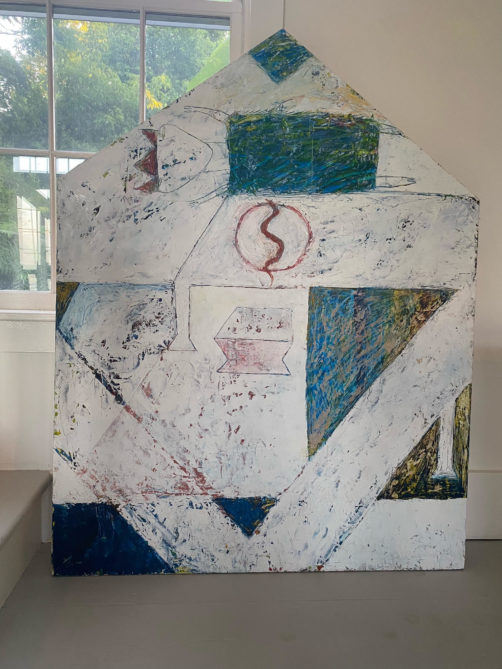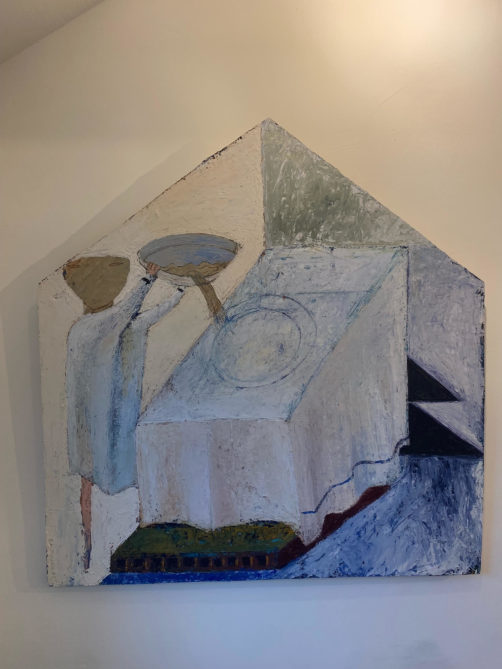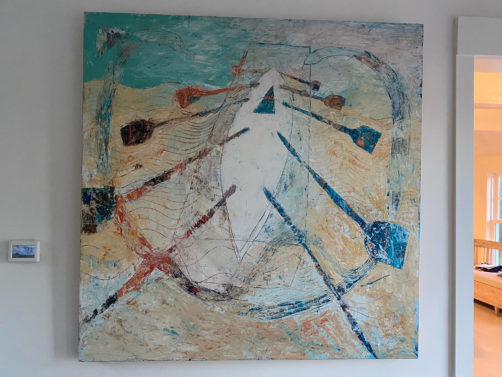The author and award-winning filmmaker Rebecca Miller returned to short fiction this month for the first time since her collection of stories, Personal Velocity, with the arresting and darkly prescient Total. From Dublin to Martha’s Vineyard, from the anxious comforts of motherhood to a technologically infected near future that mirrors today with dark prescience, each story is a world of its own, painted with vivid strokes, whose people and questions stay with the reader long after the story has ended. We’re thrilled to share a conversation with Miller and her longtime editor, Jonathan Galassi, about her writing and the stories in Total.

Original painting by Rebecca Miller
Jonathan Galassi: Total is a book you wrote over many years while you were involved in other projects—fiction and film. Its range of subject matter and characters are prodigious, yet it has an undeniable unity. How would you describe the range of your approaches here and the concerns that hold the book together?
Rebecca Miller: I had the luxury of time and no expectations as I wrote these stories; they were written in a spirit of freedom, some of them over a long span of time. For example, “Total,” the title story, took years—I carried a small notebook around and wrote whenever I thought of a line. Then eventually I sat down and wrote the story in a more unified way. But that story is visually very linked to my paintings from the 1980’s and ’90’s, which are in turn reflective of a repetitive cycle of dreams I had for many years, in which I had a baby with a triangular head, and I kept losing her. She was able to talk in some of the dreams. In my paintings, I called her “E”. And so I called the sister of Roxanne, who has “Total Syndrome”, where the children have triangular heads, E as well.
Motherhood is very much present in many of the stories. The first, “Mrs. Covet”, was written nearly twenty years ago, when my youngest child was a baby. I remember breastfeeding while writing that story, which is packed with maternal ambivalence but also the intense, animal need to protect one’s child. The stories deal with the way that once you become a mother, you belong to the child, somehow. “Vapors”, which is about the chilling transience of romantic love, was a story I tried to write many times, but I could not find the form; finally I decided on a flood of images prompted by meeting an ex-lover while pushing a child in a stroller. This is a story which I wrote recently, about my younger self, and a period of intense confusion. I suppose many of these stores are a bridge between my older and younger self. There were things it took me years to be able to write about, perhaps because I didn’t have the distance.
In my experience, being a daughter and being a mother are mirrored experiences which do not match. I can’t seem to reconcile them. This dissonance is part of what I am working out in the book.
JG: The lack of match-up between the generations—that dissonant perspective—goes against the grain of so much received wisdom about the mother-daughter bond—the old Anne Sexton saw (“A woman is her mother—that’s the main thing”). In your stories, it’s more complicated, more painful.
RM: Yes. I think it’s perhaps more difficult to be a daughter than a mother. The children (adolescents) in Total—Lara in “The Chekhovians” and Roxanne in “Total” are trying to make sense of the family—imposed chaos in their lives from a standpoint of relative innocence, while their mothers, steeped in circumstance, inured to the everyday hypocrisies of adult existence, do not understand the pain that their children are in.
JG: I’ve been thinking about how you title your stories. You gave the name “Total” not only to your haunting tale of a child that is eerily absent, eerily other sister; but you also adopted is as the name for the book as a whole—which suggests that there is something super-charged, overwhelming, inescapable in the family relation. “Or “The Chekhovians,” about a perceptive young girl’s seeing-into a super-privileged family encroaching on her own. This title suggests “Chekhovian feelings”—regret, alienation, yearning. Where do your titles come from?
RM: I played Anya in Peter Brooke’s production of “The Cherry Orchard” at BAM in 1986, and then we toured Leningrad, Moscow, Tiblisi, and Tokyo for many months. So, I was fully immersed in the Chekhovian experience and felt that story deeply . And the phenomenon of downward mobility, of gently moldering people who have not fulfilled their promise and will be cast aside by more competent and driven people, is touching and familiar to me. So I wanted for a long time to write a story called “The Chekhovians”, and I sort of backed into the title, conceiving of Lara Van Camp lying at the cusp of the sea while her mother watches from under an umbrella. Those two characters were at the heart of the story. I think I had written that scene before I realized they might be the Chekhovians I had been waiting for.
“Total”: for the story, the title came about because of the Total Phone, which causes the strange children in the story to be born. And the whole collection is called Total because of the titanic and ineluctable nature of the parent-child relation.
Basically when choosing a title, like many writers, I try to boil a story down to its essence, often using a word or phrase from the story—and wanting to choose something that will be intriguing! Stories are such anarchic little beings, unlike novels, which have to be more responsible. So it’s fun to name stories. It feels more free.

Original painting by Rebecca Miller
JG: Speaking of anarchy, one of my favorite stories here is “Receipts,” written in the voice of a woman whose approach to work, men, family, etc., is the polar opposite to the approach most of your other characters. Where did she come from?
RM: The main character of “Receipts” coalesced around the central event in the story, which is a sexual assault, and a woman’s ‘solution’ to the assault. I had that scene in my head for years, and could not find a way to clothe it in a story. All I knew was, I wanted her to not be traumatized by the event, but to use it to fuel her life. In order to do this, she needs to bury what happened and take it in her stride. But in the end she has to pay somehow. Everything in life exacts a price, and we all keep the receipts somewhere in our bodies. So I was stuck with the assault and no story for years. Sometimes I carry around an action like that, or a cluster of actions, for a long time before I can develop a character it happens to, or who lives through it. Finally I found the way into “Receipts” through Erica Jong’s book “Fear Of Flying”. I started writing about a young woman’s contempt for her mother, a contemporary of Jong’s; she has near-violent disdain for what she sees as weakness in her mother, and manifested itself in a kind of passive child abuse. And her anger at her mother becomes a rejection of the entire liberal aesthetic. My character is pissed off, she is frank about how she feels, she does not apologize for wanting to be rich and not have kids who will leach away her time and enslave her. She is totally unsentimental. Yet, privately, she indulges in rescue fantasies where a shooter goes wild in an airport and she saves a young mother and her children from death. Once I finally got into the groove of her voice, I was channeling her through my fillings.
Oh and another thing about naming stories. “She Came to Me”, the only story in the collection with a male protagonist, is also the title of my new film, which I am editing now. When I had written that story, in Ireland, years ago now, it occurred to me that it might be an interesting premise for a film. Years later, I ended up with a much more complex structure—a three-stranded multigenerational love story—but the central idea of the short story, of how a chance meeting and transgressive encounter with a stranger unlocks a man’s blocked creative energies, remain at the core of the film.

Original painting by Rebecca Miller
JG: Where do you think the exploring of roles that you’ve been conducting in the stories in TOTAL is going to lead you next? What are you involved with now?
RM: At the moment I am editing the film “She Came to Me”. In terms of fiction writing, when time expands again, I would love to write a novel. I have one image in my head—that’s it so far. It’s been there for many years. I am a slow worker—or rather, I seem to work best when I return to things I began long ago.
JG: Well, your always-fascinated readers are hungry for more!
Rebecca Miller is the author of the short-story collection Personal Velocity, her feature-film adaptation of which won the Grand Jury Prize at Sundance, and the novels The Private Lives of Pippa Lee (FSG, 2008), which she also adapted for the screen, and Jacob’s Folly (FSG, 2013). Her other films include Angela, The Ballad of Jack and Rose, and Maggie’s Plan. She lives in New York with her family.
Jonathan Galassi is chairman and executive editor at Farrar, Straus and Giroux.
